Genesis 13 meaning explained in AI Summary
Abram and his nephew, Lot, separate due to conflicts between their herdsmen. Abram chooses to remain in Canaan, while Lot settles in the fertile plains of Sodom and Gomorrah. God reaffirms his covenant with Abram, promising him all the land that he can see.
Genesis Chapter 13 tells the story of Abram and Lot's separation and God's reaffirmation of his covenant with Abram.
- Abram returns to Canaan: After a period in Egypt due to famine, Abram returns to the place where he first built an altar to God, between Bethel and Ai. He is wealthy from his time in Egypt, with many possessions and livestock.
- Strife arises between herdsmen: Both Abram and his nephew Lot have become very prosperous, and their herdsmen begin to quarrel over grazing land and water.
- Abram proposes separation: To avoid conflict and preserve family unity, Abram suggests to Lot that they separate. He generously gives Lot the first choice of land.
- Lot chooses the Jordan Valley: Lot chooses the well-watered plain of the Jordan River, a region that appears prosperous and fertile. He settles near Sodom, unaware of the city's wickedness.
- God reaffirms his covenant with Abram: After Lot departs, God appears to Abram and reaffirms his covenant, promising him all the land he can see as an inheritance for his descendants, who will be as numerous as the dust of the earth.
- Abram settles in Canaan: Abram moves his tent and settles near Hebron, by the oaks of Mamre, where he builds another altar to the Lord.
Key themes in Genesis 13:
- The importance of peace and unity: Abram prioritizes family harmony over personal gain, demonstrating a willingness to compromise.
- God's faithfulness and abundant blessings: Despite Abram's temporary relocation to Egypt, God remains faithful to his covenant, reaffirming his promises and blessing Abram even more.
- The consequences of choice: Lot's choice of the fertile but morally corrupt Jordan Valley foreshadows future troubles and contrasts with Abram's faith in God's guidance.
This chapter sets the stage for the divergent paths of Abram and Lot, highlighting the importance of faith, obedience, and seeking God's will above material prosperity.
Genesis 13 bible study ai commentary
Genesis 13 demonstrates the critical difference between walking by sight and walking by faith. After a moral failure in Egypt, Abram returns to the land of promise and a life of worship. When faced with conflict, his faith-filled generosity contrasts sharply with Lot's self-serving, sight-based decision. The chapter shows that separation from worldly entanglement is often necessary for God to clarify and expand His promises to the faithful. Abram’s trust is rewarded with a renewed and magnified covenant, while Lot’s choice begins a perilous journey toward judgment.
Genesis 13 Context
The historical setting is the Middle Bronze Age in Canaan. Abram and Lot are semi-nomadic pastoralists, a common lifestyle where wealth was measured in livestock and precious metals. Their movement depended on securing grazing land and water sources, which were scarce and often contested. The land was sparsely populated by various Canaanite city-states and clans (like the Perizzites), creating a complex social landscape. The strife between herdsmen was a realistic and serious threat to family unity and survival. Abram's return "up from Egypt" reverses his "down to Egypt" journey of Genesis 12, marking a restoration of his faith walk in the land God had shown him.
Genesis 13:1-4
So Abram went up from Egypt, he and his wife and all that he had, and Lot with him, into the Negeb. Now Abram was very rich in livestock, in silver, and in gold. And he journeyed on from the Negeb as far as Bethel, to the place where his tent had been at the beginning, between Bethel and Ai, to the place where he had made an altar at the first. And there Abram called upon the name of the LORD.
In-depth-analysis
- Went up from Egypt: The Hebrew
‘ālāh(to go up) is significant. It reverses the spiritual and physical "descent" (yāraḏ) into Egypt (Gen 12:10). This signifies Abram's repentance and restoration to God's intended place for him. - Very Rich: The word
kābēḏmeans "heavy," indicating immense wealth. This wealth, ironically acquired through his deception in Egypt (Gen 12:16), becomes the source of the coming strife. Worldly blessing often comes with unforeseen tests. - Returns to the Altar: Abram doesn't wander aimlessly. He intentionally returns to the specific place of his first recorded worship in the land (Gen 12:8). This is an act of rededication. He returns to his spiritual foundation after his failure.
- Called upon the name of the LORD: This act of public worship re-establishes his primary identity as a follower of Yahweh, not just a wealthy patriarch. It frames the entire chapter, which concludes with him building another altar (v. 18).
Bible references
- Gen 12:8: From there he moved to the hill country on the east of Bethel and pitched his tent... And there he built an altar to the LORD and called upon the name of the LORD. (Directly returning to his spiritual roots).
- Hos 2:7: She shall pursue her lovers but not overtake them... Then she shall say, ‘I will go and return to my first husband, for it was better for me then than now.’ (Represents Israel's call to return to God after straying).
- Psa 116:17: I will offer to you the sacrifice of thanksgiving and call on the name of the LORD. (Calling on God's name is an act of worship and dependence).
Cross references
Gen 12:10 (the descent to Egypt), Psa 42:1-2 (longing for God's presence), Joel 2:12-13 (a call to return to God), Luke 15:18-20 (the prodigal son returns).
Genesis 13:5-7
And Lot, who went with Abram, also had flocks and herds and tents, so that the land could not support both of them dwelling together; for their possessions were so great that they could not dwell together. And there was strife between the herdsmen of Abram's livestock and the herdsmen of Lot's livestock. At that time the Canaanites and the Perizzites were dwelling in the land.
In-depth-analysis
- Land could not support them: This is a practical problem born of God's blessing. Their immense wealth creates a logistical crisis over limited resources (water and pasture).
- Strife: The Hebrew
rîḇsignifies a contention or dispute. This family conflict would have been a poor testimony to the surrounding Canaanites and Perizzites. - Canaanites and Perizzites: Their presence serves two purposes.
- It heightens the tension over land scarcity.
- It highlights the need for Abram's family to represent God well. Their internal strife was a public, spiritual problem, not just a private one.
Bible references
- Gen 26:20: Then the herdsmen of Gerar quarreled with Isaac's herdsmen, saying, "The water is ours." (Shows that strife over resources was a common feature of patriarchal life).
- 1 Cor 6:6-7: but brother goes to law against brother, and that before unbelievers? To have lawsuits at all with one another is already a defeat for you. Why not rather suffer wrong? (Paul critiques public disputes among believers as a poor witness).
- Pro 13:10: By insolence comes nothing but strife, but with those who take advice is wisdom. (Strife often comes from pride and a lack of humble wisdom).
Cross references
Gen 36:6-7 (Esau and Jacob separate for the same reason), Pro 15:1 (a gentle answer turns away wrath), Phil 2:14-15 (do all things without grumbling).
Genesis 13:8-9
Then Abram said to Lot, “Let there be no strife between you and me, and between your herdsmen and my herdsmen, for we are kinsmen. Is not the whole land before you? Please separate from me. If you take the left hand, then I will go to the right, or if you take the right hand, then I will go to the left.”
In-depth-analysis
- Let there be no strife: Abram takes the initiative as the peacemaker. This demonstrates spiritual maturity, contrasting with his self-preservation in Egypt.
- For we are kinsmen: He appeals to their shared identity and relationship as the basis for unity. The Hebrew translates to "for we are men, brothers."
- Gives Lot the choice: As the patriarch and elder, Abram had the right to choose first. By deferring to Lot, he acts with extreme humility and generosity.
- Faith in action: Abram's offer demonstrates profound faith. He trusts that God's promise is not tied to a specific piece of real estate but to God Himself. He is content with whatever is left because he has God's word.
Bible references
- Phil 2:3-4: Do nothing from selfish ambition or conceit, but in humility count others more significant than yourselves. Let each of you look not only to his own interests, but also to the interests of others. (A perfect description of Abram's action).
- Rom 12:18: If possible, so far as it depends on you, live peaceably with all. (Abram exemplifies this principle).
- Mat 5:9: Blessed are the peacemakers, for they shall be called sons of God. (Abram's character reflects this beatitude).
Cross references
Pro 16:32 (slow to anger), Eph 4:1-3 (maintaining the unity of the Spirit), Heb 12:14 (strive for peace).
Genesis 13:10-13
And Lot lifted up his eyes and saw that the Jordan Valley was well watered everywhere like the garden of the LORD, like the land of Egypt, in the direction of Zoar. (This was before the LORD destroyed Sodom and Gomorrah.) So Lot chose for himself all the Jordan Valley. And Lot journeyed east. Thus they separated from each other. Abram settled in the land of Canaan, while Lot settled among the cities of the valley and moved his tent as far as Sodom. Now the men of Sodom were wicked, great sinners against the LORD.
In-depth-analysis
- Lot lifted up his eyes: A key phrase indicating a decision based on sight, not faith. He assessed the land based purely on its material and aesthetic appeal.
- Like the garden of the LORD... like the land of Egypt: This dual comparison is damning. He compares the land to Eden (the ideal of God's provision) and Egypt (the place of worldly security and recent compromise). His value system is revealed: he desires material prosperity above all else.
- Chose for himself: Lot's choice is entirely self-centered. He takes the best land without consideration for his elder uncle who had given him the choice.
- Moved his tent as far as Sodom: The Hebrew
‘ad-Səḏōmcan mean "toward" or "up to" Sodom. This depicts a gradual compromise. He didn't move into the city at first, but his proximity indicates his tolerance of its environment and the direction of his heart. - Narrator's Comment (v. 13): This is a moment of dramatic irony. The narrator gives the reader crucial information that Lot either ignores or doesn't know. The external beauty of the land masked a deep, internal moral corruption.
Bible references
- 2 Cor 5:7: For we walk by faith, not by sight. (Lot provides the negative example of this truth).
- 1 John 2:15-16: For all that is in the world—the desires of the flesh and the desires of the eyes and pride of life—is not from the Father but is from the world. (Lot's decision was driven by the "desires of the eyes").
- 2 Pet 2:7-8: and if he rescued righteous Lot, greatly distressed by the sensual conduct of the wicked (for as that righteous man lived among them day after day, he was tormenting his righteous soul over their lawless deeds)... (The New Testament confirms the spiritual cost of Lot's choice).
Cross references
Gen 3:6 (Eve "saw that the tree was good for food"), Josh 7:21 (Achan saw, coveted, and took), Mat 6:22-23 (the eye is the lamp of the body).
Polemics: This passage is a subtle polemic against Canaanite fertility cults and a worldview that equates material prosperity with divine blessing regardless of morality. While the land looked like a garden, its inhabitants' wickedness made it spiritually barren and destined for judgment. The true blessing was with Abram in the less attractive, but promised, land.
Genesis 13:14-17
The LORD said to Abram, after Lot had separated from him, “Lift up your eyes and look from the place where you are, northward and southward and eastward and westward, for all the land that you see I will give to you and to your offspring forever. I will make your offspring as the dust of the earth, so that if one can count the dust of the earth, your offspring also can be counted. Arise, walk through the length and the breadth of the land, for I will give it to you.”
In-depth-analysis
- After Lot had separated: God speaks to Abram after the separation. The removal of the worldly influence (Lot) created the space for a clearer and expanded revelation from God.
- Lift up your eyes: God uses the same language as Lot (v. 10), but for a different purpose. Lot looked for himself; God commands Abram to look by faith to receive a divine promise. Abram gets the land in all four directions, not just the one Lot chose.
- Offspring as the dust: This is the first time the "numerous descendants" promise is given a simile. It's a hyperbole emphasizing a countless number that will fill the land. This directly answers Abram's childlessness.
- Walk through the land: This was a symbolic act of taking possession. In the Ancient Near East, walking the boundaries of a property was a legal act of claiming it. For Abram, it was an act of faith, trusting that God would fulfill His word.
Bible references
- Heb 11:9: By faith he went to live in the land of promise, as in a foreign land, living in tents with Isaac and Jacob, heirs with him of the same promise. (Defines Abram's entire life as an act of faith-based sojourning).
- Gen 15:5: And he brought him outside and said, "Look toward heaven, and number the stars... So shall your offspring be." (The promise is later expanded to be as countless as the stars).
- Rom 4:13: For the promise to Abraham and his offspring that he would be heir of the world did not come through the law but through the righteousness of faith. (Paul confirms that Abram's inheritance was based on faith, not works or lineage alone).
Cross references
Deu 34:1-4 (Moses sees the promised land), Gen 22:17 (descendants like sand), Jer 33:22 (promise reaffirmed).
Genesis 13:18
So Abram moved his tent and came and settled by the oaks of Mamre, which are at Hebron, and there he built an altar to the LORD.
In-depth-analysis
- Moved his tent: Abram immediately obeys the command to "arise, walk." His faith is active, not passive.
- Hebron: This location becomes a key site in Israel's history. Hebron is where the patriarchs would be buried (Gen 23), where David would be anointed king (2 Sam 2:4), and where Caleb would claim his inheritance (Josh 14). Abram is settling in a place of great future significance.
- Built an altar to the LORD: Abram’s journey is punctuated by worship. Every major move or divine encounter results in an altar. His life is anchored in relationship and communion with God, contrasting with Lot's life, which is anchored in proximity to worldly centers.
Bible references
- Gen 23:17-20: the field of Ephron... which was at Mamre... was made over to Abraham as a possession... Abraham buried Sarah his wife in the cave. (Hebron becomes his family's final resting place, a claim on the land even in death).
- Gen 12:7-8: ...he built there an altar to the LORD... and there he built an altar to the LORD. (The consistent pattern of Abram's faith response).
- Heb 13:10, 15: We have an altar from which those who serve the tent have no right to eat... let us continually offer up a sacrifice of praise to God. (Christians' spiritual altar is a continual offering of praise).
Cross references
Gen 35:27 (Jacob later dwells at Mamre), Josh 14:13-14 (Caleb inherits Hebron because he wholly followed the LORD).
Genesis chapter 13 analysis
- Typology of Abram and Lot: Abram is consistently used in scripture as the archetype of the "man of faith" (Rom 4, Gal 3, Heb 11). Lot serves as a biblical archetype of the "carnal believer" or worldly person. He is called "righteous" (2 Pet 2:7), yet his decisions are consistently driven by worldly appeal, leading him and his family to ruin.
- The Altar vs. The City: The chapter creates a powerful contrast. Abram’s life is marked by altars—portable places of worship and communion with God. Lot’s life becomes marked by proximity to cities—human centers of culture, commerce, and, in this case, profound sin. Abram's security is in God; Lot's is in urban society.
- The Test of Blessing: Genesis 12 showed Abram being tested by famine (lack). Genesis 13 shows him being tested by wealth (abundance). His character is proven in both scenarios, especially after his moral recovery from the Egypt incident. This demonstrates that blessing can be as great a test of character as hardship.
- Spiritual Geography: The chapter's geography is theological. "Going down" to Egypt is a spiritual low. "Going up" to Bethel is a restoration. Lot's move "east" toward the Jordan Valley is biblically symbolic, often representing a move away from God (Gen 3:24, Adam and Eve driven east; Gen 4:16, Cain goes east; Gen 11:2, people moved east to build Babel).
- A Chiasm of Faith: The chapter can be seen as having a chiastic (inverted parallel) structure centered on the separation:A. Abram at the Altar of Bethel (v. 1-4)B. Conflict from worldly possessions (v. 5-7)C. Abram's gracious offer of separation (v. 8-9)C'. Lot's sight-based choice of separation (v. 10-13)B'. Blessing from God's promise (v. 14-17)A'. Abram at the Altar of Hebron (v. 18)
Genesis 13 summary
Abram, returning from a moral compromise in Egypt, rededicates himself to God at his old altar. Faced with strife caused by his and Lot's great wealth, Abram graciously offers Lot first choice of the land. Lot chooses the well-watered but wicked Jordan Valley based on sight, moving toward Sodom. After this separation, God appears to Abram, reaffirming and expanding the covenant promise of land and descendants. In response, Abram moves to Hebron and builds another altar, continuing his life of faith and worship.
Genesis 13 AI Image Audio and Video


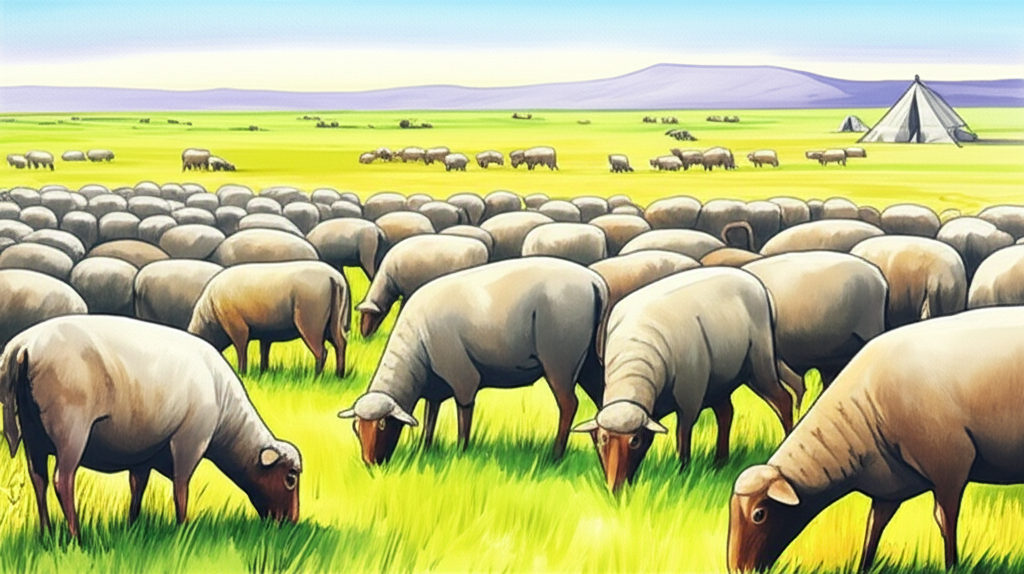
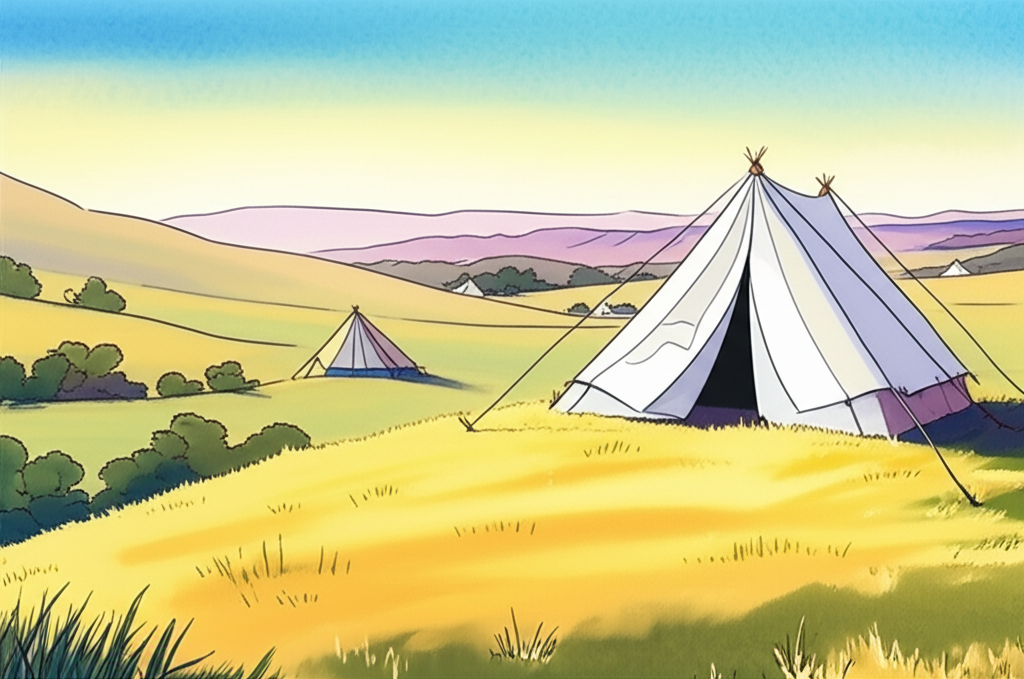

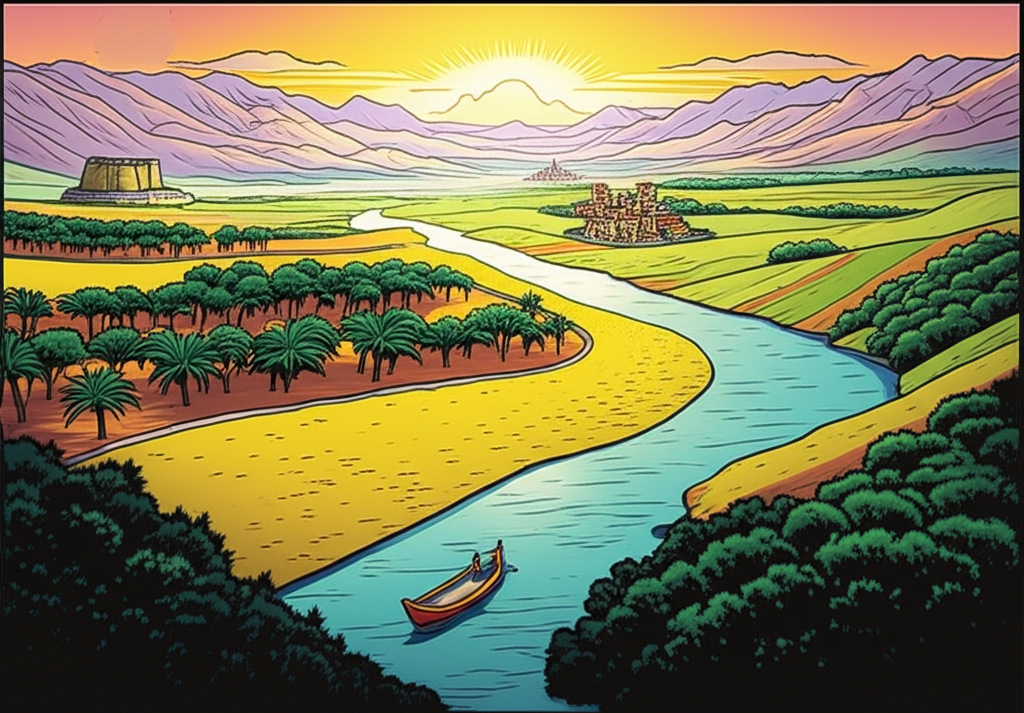

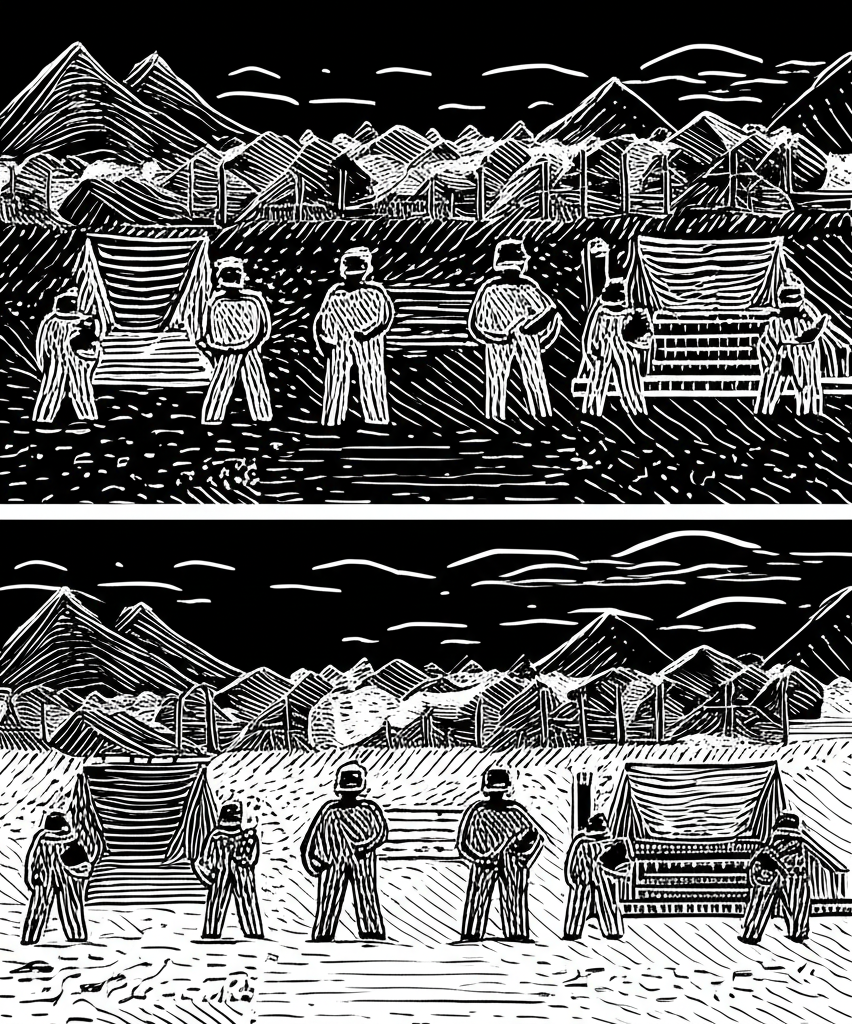
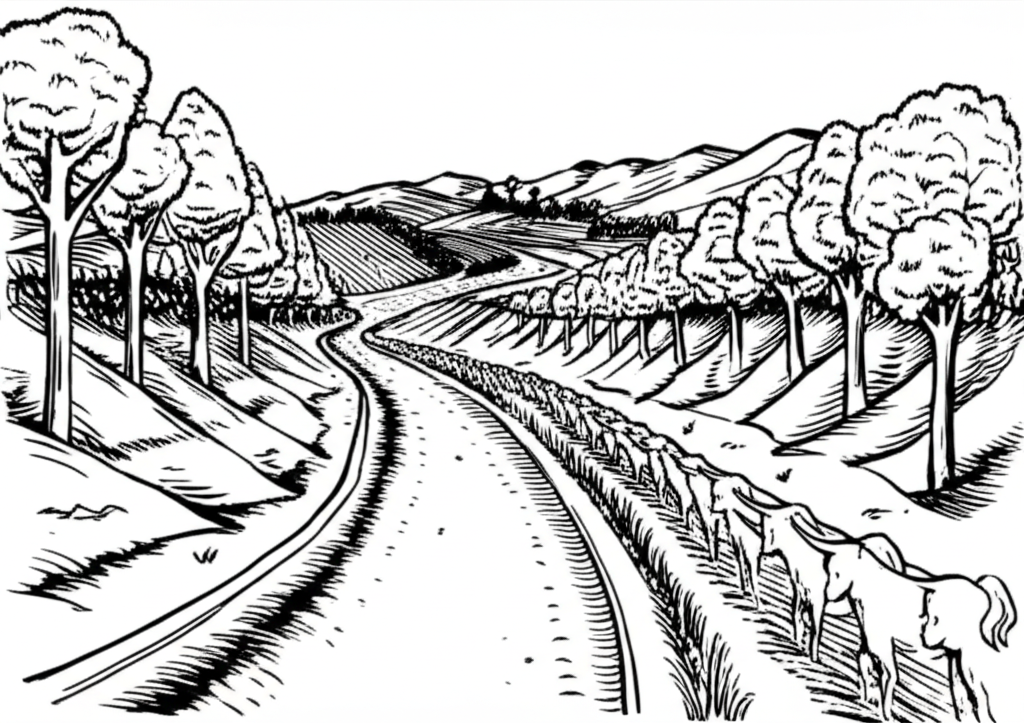
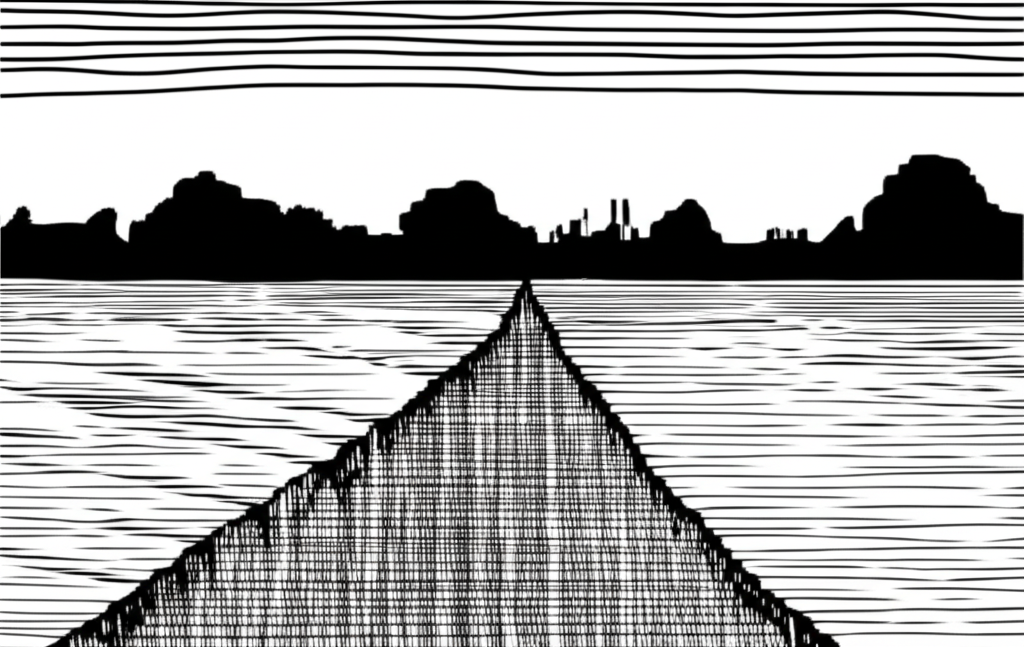
Genesis chapter 13 kjv
- 1 And Abram went up out of Egypt, he, and his wife, and all that he had, and Lot with him, into the south.
- 2 And Abram was very rich in cattle, in silver, and in gold.
- 3 And he went on his journeys from the south even to Bethel, unto the place where his tent had been at the beginning, between Bethel and Hai;
- 4 Unto the place of the altar, which he had make there at the first: and there Abram called on the name of the LORD.
- 5 And Lot also, which went with Abram, had flocks, and herds, and tents.
- 6 And the land was not able to bear them, that they might dwell together: for their substance was great, so that they could not dwell together.
- 7 And there was a strife between the herdmen of Abram's cattle and the herdmen of Lot's cattle: and the Canaanite and the Perizzite dwelled then in the land.
- 8 And Abram said unto Lot, Let there be no strife, I pray thee, between me and thee, and between my herdmen and thy herdmen; for we be brethren.
- 9 Is not the whole land before thee? separate thyself, I pray thee, from me: if thou wilt take the left hand, then I will go to the right; or if thou depart to the right hand, then I will go to the left.
- 10 And Lot lifted up his eyes, and beheld all the plain of Jordan, that it was well watered every where, before the LORD destroyed Sodom and Gomorrah, even as the garden of the LORD, like the land of Egypt, as thou comest unto Zoar.
- 11 Then Lot chose him all the plain of Jordan; and Lot journeyed east: and they separated themselves the one from the other.
- 12 Abram dwelled in the land of Canaan, and Lot dwelled in the cities of the plain, and pitched his tent toward Sodom.
- 13 But the men of Sodom were wicked and sinners before the LORD exceedingly.
- 14 And the LORD said unto Abram, after that Lot was separated from him, Lift up now thine eyes, and look from the place where thou art northward, and southward, and eastward, and westward:
- 15 For all the land which thou seest, to thee will I give it, and to thy seed for ever.
- 16 And I will make thy seed as the dust of the earth: so that if a man can number the dust of the earth, then shall thy seed also be numbered.
- 17 Arise, walk through the land in the length of it and in the breadth of it; for I will give it unto thee.
- 18 Then Abram removed his tent, and came and dwelt in the plain of Mamre, which is in Hebron, and built there an altar unto the LORD.
Genesis chapter 13 nkjv
- 1 Then Abram went up from Egypt, he and his wife and all that he had, and Lot with him, to the South.
- 2 Abram was very rich in livestock, in silver, and in gold.
- 3 And he went on his journey from the South as far as Bethel, to the place where his tent had been at the beginning, between Bethel and Ai,
- 4 to the place of the altar which he had made there at first. And there Abram called on the name of the LORD.
- 5 Lot also, who went with Abram, had flocks and herds and tents.
- 6 Now the land was not able to support them, that they might dwell together, for their possessions were so great that they could not dwell together.
- 7 And there was strife between the herdsmen of Abram's livestock and the herdsmen of Lot's livestock. The Canaanites and the Perizzites then dwelt in the land.
- 8 So Abram said to Lot, "Please let there be no strife between you and me, and between my herdsmen and your herdsmen; for we are brethren.
- 9 Is not the whole land before you? Please separate from me. If you take the left, then I will go to the right; or, if you go to the right, then I will go to the left."
- 10 And Lot lifted his eyes and saw all the plain of Jordan, that it was well watered everywhere (before the LORD destroyed Sodom and Gomorrah) like the garden of the LORD, like the land of Egypt as you go toward Zoar.
- 11 Then Lot chose for himself all the plain of Jordan, and Lot journeyed east. And they separated from each other.
- 12 Abram dwelt in the land of Canaan, and Lot dwelt in the cities of the plain and pitched his tent even as far as Sodom.
- 13 But the men of Sodom were exceedingly wicked and sinful against the LORD.
- 14 And the LORD said to Abram, after Lot had separated from him: "Lift your eyes now and look from the place where you are? northward, southward, eastward, and westward;
- 15 for all the land which you see I give to you and your descendants forever.
- 16 And I will make your descendants as the dust of the earth; so that if a man could number the dust of the earth, then your descendants also could be numbered.
- 17 Arise, walk in the land through its length and its width, for I give it to you."
- 18 Then Abram moved his tent, and went and dwelt by the terebinth trees of Mamre, which are in Hebron, and built an altar there to the LORD.
Genesis chapter 13 niv
- 1 So Abram went up from Egypt to the Negev, with his wife and everything he had, and Lot went with him.
- 2 Abram had become very wealthy in livestock and in silver and gold.
- 3 From the Negev he went from place to place until he came to Bethel, to the place between Bethel and Ai where his tent had been earlier
- 4 and where he had first built an altar. There Abram called on the name of the LORD.
- 5 Now Lot, who was moving about with Abram, also had flocks and herds and tents.
- 6 But the land could not support them while they stayed together, for their possessions were so great that they were not able to stay together.
- 7 And quarreling arose between Abram's herders and Lot's. The Canaanites and Perizzites were also living in the land at that time.
- 8 So Abram said to Lot, "Let's not have any quarreling between you and me, or between your herders and mine, for we are close relatives.
- 9 Is not the whole land before you? Let's part company. If you go to the left, I'll go to the right; if you go to the right, I'll go to the left."
- 10 Lot looked around and saw that the whole plain of the Jordan toward Zoar was well watered, like the garden of the LORD, like the land of Egypt. (This was before the LORD destroyed Sodom and Gomorrah.)
- 11 So Lot chose for himself the whole plain of the Jordan and set out toward the east. The two men parted company:
- 12 Abram lived in the land of Canaan, while Lot lived among the cities of the plain and pitched his tents near Sodom.
- 13 Now the people of Sodom were wicked and were sinning greatly against the LORD.
- 14 The LORD said to Abram after Lot had parted from him, "Look around from where you are, to the north and south, to the east and west.
- 15 All the land that you see I will give to you and your offspring forever.
- 16 I will make your offspring like the dust of the earth, so that if anyone could count the dust, then your offspring could be counted.
- 17 Go, walk through the length and breadth of the land, for I am giving it to you."
- 18 So Abram went to live near the great trees of Mamre at Hebron, where he pitched his tents. There he built an altar to the LORD.
Genesis chapter 13 esv
- 1 So Abram went up from Egypt, he and his wife and all that he had, and Lot with him, into the Negeb.
- 2 Now Abram was very rich in livestock, in silver, and in gold.
- 3 And he journeyed on from the Negeb as far as Bethel to the place where his tent had been at the beginning, between Bethel and Ai,
- 4 to the place where he had made an altar at the first. And there Abram called upon the name of the LORD.
- 5 And Lot, who went with Abram, also had flocks and herds and tents,
- 6 so that the land could not support both of them dwelling together; for their possessions were so great that they could not dwell together,
- 7 and there was strife between the herdsmen of Abram's livestock and the herdsmen of Lot's livestock. At that time the Canaanites and the Perizzites were dwelling in the land.
- 8 Then Abram said to Lot, "Let there be no strife between you and me, and between your herdsmen and my herdsmen, for we are kinsmen.
- 9 Is not the whole land before you? Separate yourself from me. If you take the left hand, then I will go to the right, or if you take the right hand, then I will go to the left."
- 10 And Lot lifted up his eyes and saw that the Jordan Valley was well watered everywhere like the garden of the LORD, like the land of Egypt, in the direction of Zoar. (This was before the LORD destroyed Sodom and Gomorrah.)
- 11 So Lot chose for himself all the Jordan Valley, and Lot journeyed east. Thus they separated from each other.
- 12 Abram settled in the land of Canaan, while Lot settled among the cities of the valley and moved his tent as far as Sodom.
- 13 Now the men of Sodom were wicked, great sinners against the LORD.
- 14 The LORD said to Abram, after Lot had separated from him, "Lift up your eyes and look from the place where you are, northward and southward and eastward and westward,
- 15 for all the land that you see I will give to you and to your offspring forever.
- 16 I will make your offspring as the dust of the earth, so that if one can count the dust of the earth, your offspring also can be counted.
- 17 Arise, walk through the length and the breadth of the land, for I will give it to you."
- 18 So Abram moved his tent and came and settled by the oaks of Mamre, which are at Hebron, and there he built an altar to the LORD.
Genesis chapter 13 nlt
- 1 So Abram left Egypt and traveled north into the Negev, along with his wife and Lot and all that they owned.
- 2 (Abram was very rich in livestock, silver, and gold.)
- 3 From the Negev, they continued traveling by stages toward Bethel, and they pitched their tents between Bethel and Ai, where they had camped before.
- 4 This was the same place where Abram had built the altar, and there he worshiped the LORD again.
- 5 Lot, who was traveling with Abram, had also become very wealthy with flocks of sheep and goats, herds of cattle, and many tents.
- 6 But the land could not support both Abram and Lot with all their flocks and herds living so close together.
- 7 So disputes broke out between the herdsmen of Abram and Lot. (At that time Canaanites and Perizzites were also living in the land.)
- 8 Finally Abram said to Lot, "Let's not allow this conflict to come between us or our herdsmen. After all, we are close relatives!
- 9 The whole countryside is open to you. Take your choice of any section of the land you want, and we will separate. If you want the land to the left, then I'll take the land on the right. If you prefer the land on the right, then I'll go to the left."
- 10 Lot took a long look at the fertile plains of the Jordan Valley in the direction of Zoar. The whole area was well watered everywhere, like the garden of the LORD or the beautiful land of Egypt. (This was before the LORD destroyed Sodom and Gomorrah.)
- 11 Lot chose for himself the whole Jordan Valley to the east of them. He went there with his flocks and servants and parted company with his uncle Abram.
- 12 So Abram settled in the land of Canaan, and Lot moved his tents to a place near Sodom and settled among the cities of the plain.
- 13 But the people of this area were extremely wicked and constantly sinned against the LORD.
- 14 After Lot had gone, the LORD said to Abram, "Look as far as you can see in every direction ? north and south, east and west.
- 15 I am giving all this land, as far as you can see, to you and your descendants as a permanent possession.
- 16 And I will give you so many descendants that, like the dust of the earth, they cannot be counted!
- 17 Go and walk through the land in every direction, for I am giving it to you."
- 18 So Abram moved his camp to Hebron and settled near the oak grove belonging to Mamre. There he built another altar to the LORD.
- Bible Book of Genesis
- 1 The beginning
- 2 Adam and Eve
- 3 The Fall of Man
- 4 Cain and Abel
- 5 Adam to Noah
- 6 Noah and the flood
- 7 The great flood
- 8 Seed time and harvest time
- 9 Rainbow covenant and Sons of Noah
- 10 Noah's sons
- 11 The Tower of Babel
- 12 Story of Abraham
- 13 Abraham and Lot
- 14 Melchizedek blesses Abraham
- 15 Abrahamic covenant ceremony
- 16 Abraham's Ishmael by Hagar
- 17 Abram circumcision
- 18 Abraham and the three angels
- 19 Sodom and gomorrah
- 20 Abraham Deceives Abimelech
- 21 Abraham's Issac by Sarah
- 22 Abraham sacrificing Isaac
- 23 Sarah's Death and Burial
- 24 Rebekah and Isaac
- 25 Jacob and Esau
- 26 God's Promise to Isaac
- 27 Jacob deceives Isaac
- 28 Jacob's dream at Bethel
- 29 Jacob Rachel Leah
- 30 Jacob's Prosperity
- 31 Jacob flees from Laban
- 32 Jacob wrestles with god's angel
- 33 Jacob and Esau reconcile
- 34 Defiling of Dinah
- 35 12 sons of Jacob
- 36 Esau descendants the edomites
- 37 Dreams of Joseph the dreamer
- 38 Onan Tamar and Judah
- 39 Joseph and Potiphar's wife
- 40 Dreams of Pharaoh's servants
- 41 Joseph interprets dreams of Pharaoh
- 42 Joseph in egypt
- 43 Joseph and Benjamin
- 44 Joseph tests his brothers
- 45 Joseph reveals his identity
- 46 Jacob family tree bible
- 47 Famine and Jacob in Goshen
- 48 Ephraim and Manasseh
- 49 Jacob blesses his 12 sons
- 50 Joseph and Jacob buried